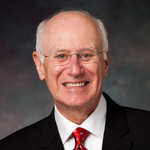By Doug Beacham
The IPHC focus this year is on the first of our core values: We Prayerfully Value Scripture. I’ve been giving this a lot of thought. You will be seeing numerous articles, short videos, and the like at our website through this year as we place focus on the Bible.
Many of you use yearly Bible reading guides. For years, my wife Susan has read through the Bible using some of these guides. I’m grateful that our friends at YouVersion are working with IPHC in promotion of this extremely popular and readily available Bible app.
At various times and places, I have attended church services in congregations with a stronger liturgical bent than the average IPHC congregation. I have always left impacted by one clear aspect in those services: the amount of Scripture that is read aloud. Usually there is a reading from one of the Old Testament books of the Pentateuch, the Histories, or the Prophets. Then there is a reading from the Psalms. Then the Gospels (which are always honored in some special way by standing or some response), and finally a reading from one of the New Testament letters. Usually those texts are not randomly chosen but joined together as Scripture enlightens Scripture.
This stands in sharp contrast to what normally occurs in our church settings. Usually the only text that is read is that portion of Scripture from which the pastor will be preaching. Sometimes it is only a verse or two. As I write, I’m looking at myself in the spiritual mirror and trying to pull the log out of my own eye!
It has always bothered me that we Pentecostals, who put so much emphasis on the Spirit, read aloud so little of the Scriptures in our services. I fear we have contributed to the rather sad state of Biblical knowledge in many of our churches and certainly in the larger Christian community.
Sunday School, which has long since been out of vogue in many congregations, followed a seven-year cycle where at least every seven years almost the entire Bible was covered for adults, young adults, and teens. That was too boring for most of us and we either dropped Sunday School or simply dropped out. The good news is that LifeSprings Resources still produces excellent curriculum covering the whole Bible.
At some point in the 1990s I was teaching in London at the IPHC Centre for International Christian Ministries. That year my teenage son flew over and we spent some personal time together, which included attending Sunday service at St. Paul’s Cathedral. I will never forget the sounds of the huge pipe organ, the tourists milling around, the diverse congregation singing, and Douglas and I listening to the Scripture from both Testaments.
Then the minister stood in the historic pulpit and began to preach a sermon that would have made Billy Graham proud. It was an unapologetic plea, based on the testimony of so much Scripture, that “ye must be born again.” At the close, the minister had us stand and as the great pipe organ filled Christopher Wren’s majestic hall, we sang the old hymn, “Stand Up, Stand Up for Jesus.”
This service moved me so much that I got a copy of The Book of Common Prayer and still use it to read the Psalms and prayers that are part of our heritage. We are Pentecostal “Holiness,” the ‘Holiness” aspect birthed in Scripture and connected to the John Wesley dimension of the Methodist/Anglican tradition.
I’m all in for personal, devotional, and consistent reading of the Bible. I am also convinced that when we replaced Sunday morning Bible study with “relevant” topics or with expanded music that we unintentionally contributed to our collective loss of Biblical knowledge. I think small groups are great; but if they don’t focus on the Word then the group is at the mercy of the strongest influencer in the setting.
This week, and this year, I appeal to the ministers of the IPHC: let our sermon preparation be filled with the whole counsel of God. Let the Bible be the basis of our sermons. Let the Holy Spirit lead us to the texts in the Psalms, other parts of the Old Testament, the Gospels and the Epistles, that will enable our flocks to hear more of this Life-Giving Word. We don’t have to read them all: invite others in the congregation to share those portions of Scripture. Let our message declare the Gospel of Jesus Christ with the accompanying sounds of the full symphony of God’s Word! Let the message itself be filled with Biblical phrases that carry truth and hope on their wings.
After all, God has promised that it is His “Word that will not return void,” not our words (Isaiah 55:11). As the Apostle Paul wrote, “So faith comes by hearing, and hearing by the Word of God”



